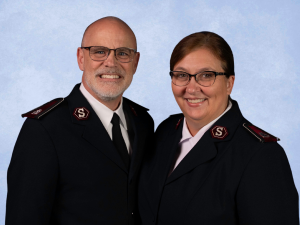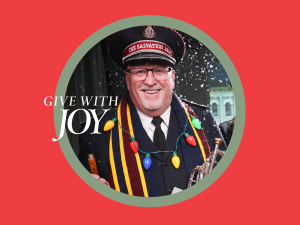Welcome back to Walking With Jesus: A Journey to the Cross, a special series with Major Dr. Terry Masango.
Last week, we explored the parable of the Lost Sheep and discovered how Jesus, our Good Shepherd, actively searches for us no matter how far we’ve strayed.
Today, we turn to one of Jesus’ most profound and challenging parables: The Good Samaritan. This story isn’t just about helping others—it completely redefines what it means to be a neighbor and challenges our assumptions about who deserves our love and compassion.
In our world, we’re often divided by differences—political views, cultural backgrounds, socioeconomic status. We build invisible walls between “us” and “them.” But in this message, Major Masango reminds us of Father Damien, who in 1873 volunteered to serve in an island leper colony. When the residents asked, “Where is God?”, Father Damien answered with his presence, serving them just as Jesus would.
This week’s message asks us a critical question: Who is our neighbor? And more importantly, to whom are we being a neighbor? As Major Masango explains, real love gets close. Real love notices people. Real love is willing to be interrupted and inconvenienced.
As we journey toward Holy Week together, I want to remind you about the Holy Week Art Journal available from Caring Magazine. If you haven’t downloaded it yet, today’s message about the Good Samaritan pairs beautifully with the journal’s activities that help us visualize walking alongside Jesus through Jerusalem.
You can get it now so you are ready to join in this Holy Week—just visit caringmagazine.org/journey or use the link in our show notes to download your free copy.
Now, let’s listen as Major Dr. Terry Masango unpacks the parable of the Good Samaritan and challenges us to cross boundaries with compassion, just as Jesus did.
Listen and subscribe to The Do Gooders Podcast now. Below is a transcript of the episode, edited for readability. For more information on the people and ideas in the episode, see the links at the bottom of this post.
* * *
You have probably heard of the island of Molokai. Well, it’s located in the state of Hawaii. It has quite a history. You have to go way back to the 1800s to understand its significance.
You see, back then there was no cure for the highly contagious and deadly disease called leprosy, a disease that would attack the extremities of the body, the ears, the toes, the nose, the fingers. A horrible, dreadful disease, which today is curable, but it wasn’t back then. So in order to keep the disease at bay, in order to keep it from spreading and creating an epidemic, the government would send lepers to a colony on the island of Molokai where they would be secluded and isolated from those who were not infected with the disease.
Well, in 1873, there was a young, brave Catholic priest called Father Damien, who volunteered to spend his life serving the people secluded on the island of Molokai.
When he arrived, he was startled to see people who were not only suffering physically, but socially, emotionally and spiritually. In the leper colony, he saw extreme drunkenness, immorality, abuse, and an overall sense of hopelessness. What he saw were people who desperately needed to know the answer to the question they were asking—where is God? They needed God’s presence in their life.
And so in 1873, Father Damien lived among the 700 lepers on Molokai. Knowing the dangers, realizing the inevitable results of such personal contact with a highly contagious disease, Father Damien built hospitals, clinics and churches, and built some 600 coffins. And the whole while he was giving them the answer to that question—where is God?
The Scripture today comes from Luke 10. I’ll be reading from verses 25 to 37. The title of it is The Parable of the Good Samaritan.
On one occasion an expert in the law stood up to test Jesus. “Teacher,” he asked, “what must I do to inherit eternal life?”
“What is written in the Law?” he replied. “How do you read it?”
He answered, “‘Love the Lord your God with all your heart and with all your soul and with all your strength and with all your mind’[a]; and, ‘Love your neighbor as yourself.’”
“You have answered correctly,” Jesus replied. “Do this and you will live.”
But he wanted to justify himself, so he asked Jesus, “And who is my neighbor?”
In reply Jesus said: “A man was going down from Jerusalem to Jericho, when he was attacked by robbers. They stripped him of his clothes, beat him and went away, leaving him half dead. A priest happened to be going down the same road, and when he saw the man, he passed by on the other side. So too, a Levite, when he came to the place and saw him, passed by on the other side. But a Samaritan, as he traveled, came where the man was; and when he saw him, he took pity on him. He went to him and bandaged his wounds, pouring on oil and wine. Then he put the man on his own donkey, brought him to an inn and took care of him. The next day he took out two denarii and gave them to the innkeeper. ‘Look after him,’ he said, ‘and when I return, I will reimburse you for any extra expense you may have.’
“Which of these three do you think was a neighbor to the man who fell into the hands of robbers?”
The expert in the law replied, “The one who had mercy on him.”
Jesus told him, “Go and do likewise.”
Now, this is a familiar passage of Scripture. There’s even laws called Good Samaritan Laws in our land, but the story is anchored in the Book of Luke, the Gospel of Luke. The Gospel of Luke was written by the physician, Luke, who was one of Jesus’ disciples. His goal and his theme was to talk about how Jesus represented those who were on the fringes of society, how Jesus came to seek and save the lost, how Jesus cared for those that most people called the sinners, those who were on the outside of religious circles.
So in this time, one of the religious people had come to Jesus and asked him a question or tested him as the Scripture said, wanted to find out what Jesus thought. He said to Jesus, “So who is my neighbor?” In Jesus’, typical fashion, he didn’t give facts. He told a story.
You see, stories are powerful. Stories are powerful teaching tools today, and they were back then as well. The Gospel itself by itself is hard to take, but it needs stories so that people will remember it and be able to apply it. They can relate to stories. Stories evoke emotions. They touch on the deepest parts of human beings that facts and logic and numbers don’t touch. So Jesus knew to answer the question—who’s my neighbor—he needed to tell a story.
He told a story of a man who was traveling from Jerusalem. As he’s traveling from Jerusalem, he’s attacked by robbers. They beat him. They took everything from him, and they left him for dead. A priest, a man of the cloth, sees him and goes by the other side and walks past. A Levite, another religious man sees this man and walks past.
But Samaritans were not Jews. Samaritans were a race that had come up after Jews had intermarried with pagan nations. So the Jews didn’t talk with Samaritans, didn’t like Samaritans. They called them half-castes. They called them the people who don’t deserve their time.
Yet it was the Samaritan who took time to get off his donkey, went down, and cleaned the wounds of the beaten man and put him on his donkey and took him into an inn and even paid with his own money to have that man be kept there. So what we learned from them?
Firstly the victim, let’s look at the victim. The victim, as we read in verse 30 was going, as the Bible says, he went down from Jerusalem to Jericho. Just by that when you hear went down from Jerusalem to Jericho, there’s a few things we can learn from there.
Firstly, the name Jerusalem means peace, the city of peace or the foundation of peace. So this man is walking from the city of God, the city of peace walking towards Jericho. Jericho was often related to destruction, as you know from the story in Joshua 6 where Jericho was destroyed. So he’s walking from a city that is a city of peace and he’s walking towards Jericho, a city of destruction.
This road was a treacherous road. It was known, everybody knew in Jerusalem that that road was a dangerous road because of the danger that lurked there. It was a 17-mile-long journey of navigating through rocks and treacherous way to get down to Jericho, and we say also going down because Jerusalem itself sits 2,300 feet above sea level, whereas Jericho, which is near the Dead Sea, sits 1,300 feet below sea level.
So if you do your math, you can see that there’s a difference of 3,600 feet in altitude from up at Jerusalem going down to Jericho. The narrow road, the ravines, the cliffs and the sudden turns made the road dangerous because thieves and robbers would hide in the bushes waiting to attack any travelers and take their money. They would ambush the victims and quickly take everything from them and run away. So going down this road, you were really putting yourself in danger.
Then the Bible said, “The men fell among the thieves.” It means that they destroyed everything he had. They beat him, and the Bible said they left him for dead. They stripped him of his clothing. There is a lot of shame in that. There’s a lot of hurt in that. There is a lot of destruction that happens, the harm that happens on his body and they wounded him. You can see that the danger this man was in was that he was attacked outwardly. His clothes were stripped away, his possessions were stripped away. They beat him, which means his flesh was also attacked, and then there’s a shame of being left naked for the whole world to see.
Then while he’s lying there half dead, he may have maybe seen from the corner of his eye someone coming his way, and I think if I were him lying there, I would’ve said, “Help, help, help me.” But as he is lying, there is the priest possibly coming from performing a worship service, leading a worship service, but also he must understand in this culture, they were not allowed to touch a dead person. Otherwise, you become unclean. So there is an excuse for this man, this priest, that he would’ve felt unclean, but was he more scared of being unclean and not save a life? Or would it have been better to save a life and be unclean? But it looks like he chose to walk by and ignore the man.
Then a Levite also came by and for fear of being unclean did not touch him. While they were coming from a spiritual place, they didn’t help a person in need.
I think we can learn just from there that today it’ll be horrible for any Christian or any person who says they love God to ignore those who are hurting amongst us. It is hypocrisy to say we love Jesus whom we have not seen and yet ignore the pain and the suffering that surrounds us.
These religious leaders were hypocritical in that day, were acknowledging their love for God, yet were not displaying their love for God’s creation. These two represent religious people who are at church but do not love others. They represent religious people who are too busy or too holy, too pious to mess with the poor and with those who are in need. These two represent religious people would rather stick to their schedules and their plans than help those who are in need. These two represent religious people who care more about the condition of the steeple rather than the condition of the people.
So onto the scene comes a Samaritan. The Samaritan was heading somewhere and he sees a man who is in trouble. So verse 33 tells us that he got close. He came where the man was. Get this, the religious people, two of them, two opportunities. They walked around him and left, but this stranger came where he was. Came right where the person is. Here, Jesus is teaching us that real love gets real close. Real love comes where it’s needed. Real love comes where love is missing. Unlike the priest and the Levite who walked by and watched from a distance, the Samaritan really got close.
Real love does not serve from a distance. Real love does not just write checks and pray from afar. Real love gets on a plane and goes to help. Real love walks the streets. Real love goes to the hospitals, the prisons where it’s needed. Real love gives a human touch. Real love is present. Real love does not look down on people except when it’s helping to lift them up. Real love gets down to the level of the people. It speaks their language. It walks in their shoes. Real love moves into the neighborhood.
Then the Bible then says, not only did the Samaritan come to him, he also noticed him when he saw him. There’s something to be said there that we can learn about love noticing people. It’s one thing to come close and just walk by, but it’s another to really notice them. Have you ever heard somebody look at you but look past you? You are in their face, but you look past them.
One of the stories I’ve heard from homeless people is that they say what hurts is not that people don’t give them money when they’re asking for money. What hurts is when people ignore them and act as if they’re not even there when they don’t see them, when they don’t notice them. I want to say to you today, what we learned from this is that real love notices people. Real love sees people.
This man, he noticed the bad state the victim was in. He noticed how wounded the victim was. To express love to the hurting, we have to notice them. To express love, we have to see them for who they are and what condition they are in. I want to say real love notices the hurting the hungry and the angry. Real love notices the helpless, the hopeless and the homeless. Real love notices those on the fringes, the sad and the depressed. Real love notices. Even those who pretend to be okay, yet they’re hurting. Real love notices the least, the lost and the last. Real love says, I see you and you matter.
Then it says, the Samaritan didn’t just come close, didn’t just see him, but he also was filled with compassion. He was filled with love. Imagine a person he doesn’t know, but he has seen the state is in. He has seen the harm that is befell on him. And now the Bible says he had compassion on him. He felt love. You see, you don’t have to love people because you know them. You don’t have to love people because they look like you or they talk like you. You don’t have to just love people because they are part of your family. You have to love people because they’re God’s people. God loves them and you have to love them. This man not knowing the man’s name, not knowing his culture, not knowing his background, not knowing anything about him, but the fact that this man was a human being.
He had compassion on him. I wonder if today, maybe sometimes our Christian message becomes valueless because we don’t notice people, we don’t come close to people and we don’t have compassion on people. How many times have we walked by people who are hurting and we’ve just ignored them? How many times have we said to somebody who’s hurting, I’ll pray for you and never do anything even to alleviate their pain? This man loved. He loved a stranger. He had compassion on somebody he had never even met before. You see, fake love is emotionless. Fake love lacks empathy. Fake love is dependent on moods.
Fake love turns people into projects. Fake love is done for the pictures and the show. Fake love is occasional and temporary. Fake love is driven by rewards and accolades. But may I say, when you are really a compassionate person, you demonstrate real love that comes from Jesus, real love that cares deeply for God’s people. Real love is not temporary, but it is a lifestyle. Real love doesn’t depend on status. Real love does not ask, what is in it for me? Real love is selfless and unconditional. Real love blesses others even if no one is watching.
So the Samaritan bound up his wounds.
After COVID, I noticed that I was hurting. I was sad, even borderline depressed. And I’ve noticed many people in our corps, in our churches, many people in our communities at work, at school, everywhere are dealing with a lot of loneliness and depression, sadness, anxieties, and they are brokenhearted. They need somebody to bind up their wounds.
How do we do that? By loving people, by loving the unloved. Even the difficult, even the enemies, the outcasts help heal their pain because real love melts a cold heart, real love reconciles broken relationships, real love rebuilds dysfunctional communities, real love binds up wounds and cures pain. Real love helps dissipate depression, sadness and loneliness.
I want to say that we are encouraged to show real love so that others can feel their wounds being bound up. Their broken hearts are being mended and being built up together.
Lastly, the Samaritan put the man on his own donkey. He invested his money. He invested his resources. He invested his time. He invested his money. He invested his resources. He invested his time. He was going somewhere. He could have been doing anything else, but he was willing to have his plans interrupted to be inconvenienced so that he can help somebody in need. You see, the interruptions in life are where the ministry is. Real love allows itself to be interrupted. Real love allows God to mess your plans. Real love comes at the expense of your time, your comfort, your plans, and your resources. Real love is willing to forego its pre-laid plans to be there for others. Real love says, not my will, but yours be done. Real love is costly, yes. Yet real love is rewarding.
The good Samaritan loved his neighbor. Somebody he didn’t know and spent his resources, spent his time, allowed himself to be inconvenienced and interrupted so he could demonstrate what real love is.
So when Jesus was asked, who’s my neighbor? He told this story, and then he asked the man, two of these three, who was the neighbor to the man? And the response was the one who showed mercy.
I want to say to you today, I don’t know if you identify with the priest, with the Levite or with the Good Samaritan, but the challenge is upon us, all of us who are listening, that we need to demonstrate love even to those who are not our neighbors. To those who don’t look like us, to those who don’t talk like us, who are inconveniencing, who are difficult to love, because love is real love when it’s least deserved.
So who’s my neighbor you may ask. Your neighbor is not only somebody who’s physically and geographically next to you. Your neighbor is not someone who’s just living or sitting next to you. Your neighbor is a stranger, an acquaintance, and even an enemy. My neighbor is not just a person who looks and talks like me. My neighbor is anyone of another race, culture, religion or background.
My neighbor is every human being because they’re created in God’s image. My neighbor is someone or anyone of any political party, suppose a different football team or any ethnicity or country of origin or social status or education. The Samaritan demonstrated real authentic love by loving the stranger who is his neighbor.
At the beginning, I told you the story about Father Damien and the whole while Father Damien was living amongst the people and answering the question, where is God?
And whenever church service was held, he would stand up in front of the lepers and he would warmly and lovingly address them as my dear brothers and sisters. But then one morning in 1885, at the age of 45 in a calm, clear voice, instead of saying, my dear brothers and sisters, Father Damien began by saying, my fellow lepers, I’m one of you now.
You see, it was out of love that a humble priest became one of them, they’re strangers. Out of love, he gave those lepers a gift that would change their life for all eternity. He shared with them the answer to the ever present question, where is God?
There right amongst them with the people who are least loved, who are least cared for, who are on a leper colony, on a remote island, God was right there with them.
So who’s God calling you to love? How can you better love the people who make it difficult for you to love them? Will you consider going outside of your comfort zone to show genuine, authentic love to others? How can you love more?
Additional resources:
- If you are one of the hopefuls, get on the list for the Do Good Digest, our free 3-minute weekly email newsletter used by more than 20,000 hopefuls like you for a quick pick-me-up in a busy day.
- If you are enjoying this show and want to support it, leave a rating and review wherever you listen to help new listeners hit play for the first time with more confidence.
- If you want to help The Salvation Army serve more than 27 million Americans in need each year, give today. Your gift of money, goods or time helps The Salvation Army do good all year in your community.
Listen and subscribe to the Do Gooders Podcast now.












